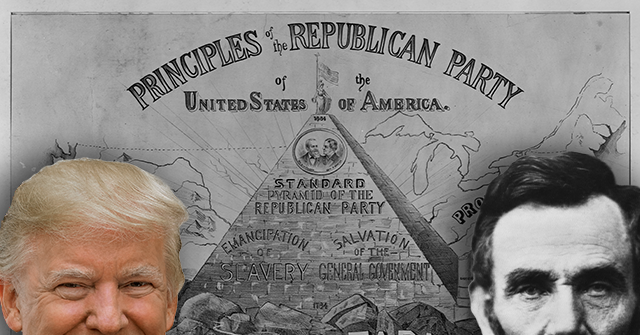The Republican Party, historically known for its support of tariffs and economic nationalism, appears to be returning to its roots amid a changing political landscape. Founded in the mid-19th century, the GOP’s commitment to protective tariffs was primarily driven by its alliance with Northern manufacturers who sought to shield American industries from foreign competition. Landmark tariffs like the Morrill Tariff of 1861 not only helped fund government initiatives but also spurred domestic manufacturing. Over the decades, this pro-tariff stance became intertwined with the party’s identity, symbolizing a protective economic policy aimed at fostering national growth during its formative years.
However, the mid-20th century marked a significant inflection point for the Republican Party. As the U.S. pursued free trade agreements post-World War II to bolster the economies of its allies in opposition to communism, GOP leaders like Dwight Eisenhower and Richard Nixon turned toward a globalist framework. Their strategy revolved around absorbing surplus production from nations like Japan and countries in Europe while, paradoxically, turning a blind eye to their protectionist practices. This approach, which was rationalized as necessary for national security, inadvertently imposed economic burdens on American workers as they faced competition against foreign markets fostered by the very tariffs designed to protect them.
The dissolution of the Cold War paradigm following the fall of the Berlin Wall led to renewed scrutiny of America’s trade policies. The rationale for supporting globalist strategies faded as the Soviet threat diminished. The transition toward opening trade with China was particularly detrimental, as it fortified the communist regime rather than integrating it into a broader coalition of free nations. Instead of fostering beneficial economic exchanges, this policy contributed to a significant erosion of U.S. manufacturing capacity while leaving American industries vulnerable to international competition without substantial reciprocal benefits.
As time progressed, a faction within the conservative movement began to challenge the lasting impacts of the Cold War global trade system, which had diluted the party’s original economic nationalist ethos. Despite resistance from traditionalists who clung to globalist policies, the Republican Party began to shift back toward its historical roots regarding tariffs. This resurgence of tariff policy drew on the frustrations of conservatives who felt abandoned by decades of globalization that failed to deliver the promised prosperity while simultaneously hollowing out American industrial employment.
Recent polling data underscores the extent of this transformation within the GOP. A significant majority of Republicans, around 71 percent, now express support for tariff proposals, illustrating a marked departure from previous decades of free trade advocacy. Within this subgroup, a notable 41 percent strongly back these tariffs, while even among conservatives, 70 percent demonstrate similar support. Interestingly, support for tariffs has also extended beyond traditional GOP boundaries, with rural Americans showing a higher inclination toward tariffs compared to urban and suburban counterparts. Additionally, educational demographics reveal that individuals with advanced degrees are more likely to favor tariff policies than those with less formal education, highlighting a surprising shift in the profile of tariff supporters.
The upcoming 2024 elections signal an even larger political transformation in American trade opinions, particularly within the Republican Party. The increasing support for tariffs among GOP constituents represents a significant ideological shift, as rural and middle-class voices join the ranks of traditional supporters. This evolving landscape indicates a recalibration of economic policies, with tariffs once again taking a central place in national discourse. The Republican Party, in effect, is reinvigorating its historical ties to economic nationalism and protective trade policies, signaling a decisive turn away from the globalization that had dominated post-war economic thinking. The emergence of this pro-tariff sentiment could fundamentally reshape the party’s engagement with trade issues, reflecting deep-seated anxieties about domestic economic security in the face of global challenges.

